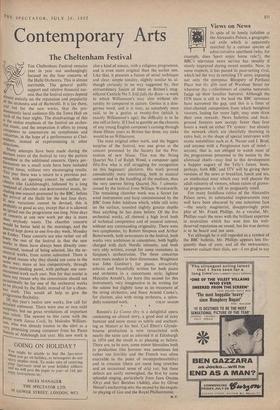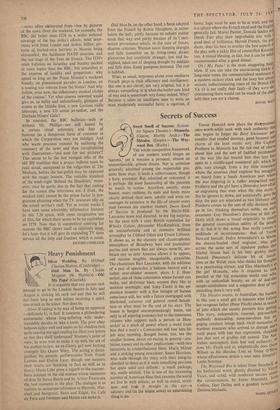Views on News
IN spite of its lonely isolation at the Alexandra Palace, a geographi- cal exile which is apparently
v matched by a curious species of
I administrative apartheid (why, for example, does Sport enjoy home rule?), the BBC's television news service has steadily if slowly improved during recent months. Now, in some respects, it has passed its pace-setting rival, which led the way in restyling TV news, exposing not only the pompous Blimpery of Portland Place but tin glib cant of Wardour Street (or wherever the confectioners of cinema newsreels fudge up their familiar horrors). Although the ITN team is still in the lead the BBC newsmen have narrowed the gap, and this is a form of inter-channel competition from which benighted viewers, lusting for more light, may soon draw their own rewards. News bulletins and back- ground features now occupy fewer than four hours a week on either TV system : but already the network chiefs are cheerfully throwing in extra bait, in the shape of special interviews with exotic notabilities such as A. Nasser and J. Brod, and anyone with a Panglossian turn of mind— anyone, that is, not obliged to watch most of the, programmes presented to the nation by the aforesaid chiefs—may find in this development a happier augury of the Telly's future. Soon, perhaps, both BBC and ITV will be giving their versions of the news at breakfast, lunch and tea, an intellectual treat which may well placate the adult minority of viewers, whose ration of grown- up programmes is still so poignantly small.
For many fastidious critics of the Alexandra Palace news, its substantial improvements may well have been obscured by one notorious face —the sourly magisterial, disapprovingly prim phiz of Mr. Frank Phillips. As a vocalist, Mr. Phillips reads the news with the brilliant expertise in neutralism which has won him his well- deserved reputation on sound; but his true destiny is to be heard and not seen.
Yet although he is still regarded as a symbol of the BBC bulletin, Mr. Phillips appears less fre- quently than of yore; and all the newscasters, however radiant their dials, are—I am glad to say —more often ololiterated from view by pictures of the news. Over the weekend, for example, the BBC did better than ITN in a wider national coverage of the bus strike's effects; brief inter- views with Peter Loader and Arthur Miller; pic- tures of, barbed-wire barriers in Nicosia being dismantled; the Sardinian NATO exercise; and the last stage of the Tour dc France. The ITN's main bulletins on Saturday and Sunday packed in more topics than the BBC, but somewhat at the expense of lucidity and proportion : why spend so long on the Prime Minister's weekend homily, on processional parades in London, on a touring war veteran from the States? And why follow, even now, the inflationary musical clichés of the cinema? Yet what cinema newsreel would give us, so deftly and unfacetiously, glimpses of events in the Middle East, a new German radio telescope, a new US aerial jet-tanker, and the Durham Miners' Gala?
In contrast, the BBC bulletins—with or without Mr. Phillips—arc still fussed by a certain ritual solemnity and fear of humour (as a dangerous form of comment in which the Corporation may not indulge). And why waste precious minutes by outlining the summary of the news and then recapitulating with illustrations—`and now for our pictures"? This seems to be the last vestigial relic of the old BH tradition that a proper bulletin must be read aloud, unexposed to the vulgarities of The Medium, before the hoi-polloi may be appeased with the magic lantern. The variable standard of the week-night 'Behind the Headlines,' more- over, may be partly due to the fact that casting for the screen (the interviews are, I think, the weakest link) cannot be the prime factor in pro- gramme planning when the TV newsmen rely on the sound service's staff. Yet in recent weeks I have seen some admirably informative features in this 7.20 space, with some imaginative use of film, for which there seems to be no equivalent on ITN. Now that in competitive catering for morons the BBC shows itself so relatively inept, let's hope that it will give its expanding TV news service all the help and freedom which it needs.
RICHARD FINDLATER































 Previous page
Previous page